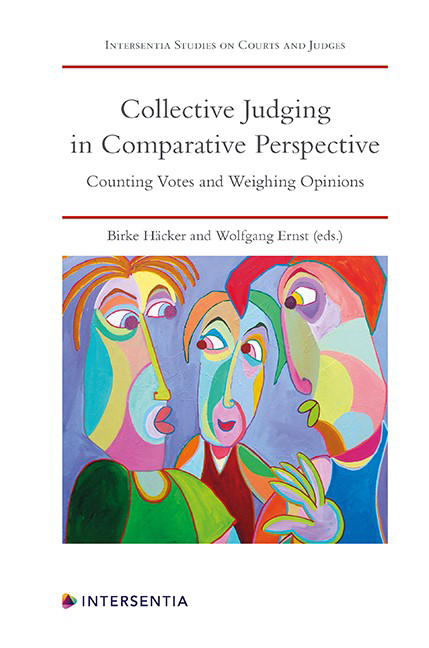Book contents
- Frontmatter
- Preface
- Contents
- List of Cases
- List of Contributors
- PART I DESIGNING COLLEGIATE COURTS’DECISION-MAKING PROCESSES
- PART II COLLEGIATE COURTS IN THE COMMON LAW TRADITION
- PART III COLLEGIATE COURTS IN THE EUROPEAN CIVIL LAW TRADITION
- PART IV COLLEGIATE COURTS IN A NON-EUROPEAN CIVIL LAW JURISDICTION: THE CASE OF JAPAN
- PART V SUPRANATIONAL AND INTERNATIONAL COLLEGIATE COURTS
- PART VI VOICES FROM THE AUDIENCE AND CLOSING REMARKS
- About the Editors
Chapter 19 - Beyond Anecdote and Synecdoche
Published online by Cambridge University Press: 09 February 2021
- Frontmatter
- Preface
- Contents
- List of Cases
- List of Contributors
- PART I DESIGNING COLLEGIATE COURTS’DECISION-MAKING PROCESSES
- PART II COLLEGIATE COURTS IN THE COMMON LAW TRADITION
- PART III COLLEGIATE COURTS IN THE EUROPEAN CIVIL LAW TRADITION
- PART IV COLLEGIATE COURTS IN A NON-EUROPEAN CIVIL LAW JURISDICTION: THE CASE OF JAPAN
- PART V SUPRANATIONAL AND INTERNATIONAL COLLEGIATE COURTS
- PART VI VOICES FROM THE AUDIENCE AND CLOSING REMARKS
- About the Editors
Summary
A retiring domestic bursar of an Oxbridge College was recently interviewed about his working life, first at Her Majesty’s Foreign and Commonwealth Office and then in charge of 500-year-old buildings and slightly younger academics. In the interview, he suggested that there were cultural differences between academics and civil servants. Academics, he implied, were self-serving, seeking personal fame through being recognised for an idea or a discovery; civil servants worked collectively and without a belief that their own contribution should be recognised. While this implication is open to serious challenge, it is perhaps best not taken at face value, but understood within the special cultural practices of a retiring British diplomat. Until recently, an ambassador leaving his or her post was permitted to send a ‘valedictory despatch’, a frank but confidential communiqué, a parting shot, sent without fear of repercussions, covering local customs, manners and morals or even the state of their drains. These missives can be particularly revealing about how diplomats, famed for their discretion, actually felt about their lives in post. That said, the frankness of the despatch should not be taken to convey truth in their contents.
The provocative report about glory-hunting academics and self-effacing civil servants might also prompt us into thinking more about what judges are doing when they collectively make decisions. Often our only insights into the judicial process are from similarly personal stories. That is quite understandable, and such glimpses can be both informative and amusing. There is also some more recent work adding layers of statistical analysis. This chapter suggests that to get whatever mileage we can out of such anecdotal comparisons and generalisations, we need to push past their face value and, in particular, put them in their proper context. This even applies to some of the language that comes most easily to hand for discussing judicial decision-making. For example, ‘collegiality‘ may be a false friend, meant to express an attitude, but each use might imply different accompanying actions, from avoiding dissent where possible to expecting reproach if a peer‘s draft judgment is not read within a matter of weeks.
- Type
- Chapter
- Information
- Collective Judging in Comparative PerspectiveCounting Votes and Weighing Opinions, pp. 327 - 338Publisher: IntersentiaPrint publication year: 2020



